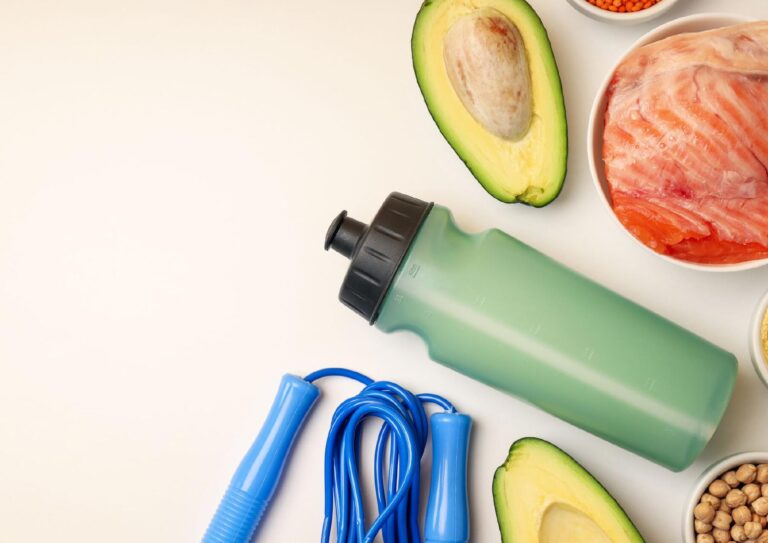What Is A Sports Nutritionist?

What Is A Sports Nutritionist: Sports Nutritionist Complete Guide!
What is a sports nutritionist? A sports nutritionist is a specialised healthcare professional who focuses on the dietary needs of athletes and active individuals. Their primary role is to optimise performance, enhance recovery, and support overall health through tailored nutritional strategies. Sports nutritionists are commonly found in various settings, including sports teams, fitness gyms, private practices, and athletic training facilities. Jake Biggs provides you the complete expert guide as to what is a sports nutritionist.
Your complete guide to what is a sports nutritionist! What you will learn:
- What Is A Sports Nutritionist?
- Understanding the Essence of Sports Nutritionists
- How Does A Sports Nutritionist Enable Athletes To Achieve Peak Performance
- Distinguishing Sports Nutritionists from Other Healthcare Professionals
- Exploring the Vast Terrain of Sports Nutrition
- The Role of Sports Nutritionists in Optimisng Performance, Health & Recovery
- Navigating the Consultation Process with Jake Biggs, Sports Nutritionist
- Exploring Specialised Areas of Sports Nutrition
- The Future of Sports Nutrition: Innovations and Opportunities
- Embracing the Transformative Power of Sports Nutrition

What Is A Sports Nutritionist?
Sports nutritionists are experts in the field of nutrition who specialise in optimising the dietary practices of athletes and physically active individuals to enhance their performance, recovery, and overall health.
Firstly, sports nutritionists conduct comprehensive assessments of athletes’ nutritional status, considering factors such as dietary intake, training regimen, performance goals, and physiological demands. They evaluate these factors alongside medical history, blood tests, and body composition measurements to identify nutritional needs and potential deficiencies.
Based on these assessments, sports nutritionists diagnose any nutritional imbalances or deficiencies that might affect an athlete’s performance and overall health. This diagnosis can range from energy deficits and micronutrient deficiencies to issues like dehydration and improper nutrient timing.
Once the diagnosis is established, sports nutritionists develop personalised sports nutrition plans tailored to the specific needs and goals of each athlete. These plans often include dietary modifications, appropriate use of supplements, and strategies for optimal nutrient timing around training and competition. The goal is to enhance performance, improve recovery, and prevent injuries.
Education and counselling are crucial aspects of a sports nutritionist’s role. They educate athletes on various nutrition-related topics, such as the importance of macronutrient balance, hydration strategies, meal planning, and the role of specific nutrients in performance. They also provide ongoing counselling and motivation to help athletes adhere to their nutrition plans effectively.
Throughout the training and competition cycles, sports nutritionists monitor athletes’ progress and adjust their nutrition plans as needed. They frequently collaborate with other healthcare professionals, such as coaches, physiotherapists, and physicians, to ensure a multidisciplinary approach to an athlete’s health and performance.
Sports nutritionists play a vital role in promoting athletic excellence and well-being through targeted nutrition strategies. They employ a holistic approach that takes into account the unique demands of sports and individual athlete needs, aiming to enhance performance, support recovery, and improve overall health.

Understanding the Essence of Sports Nutritionists
Definition and Overview: Sports nutritionists are healthcare professionals who specialise in optimising the dietary practices of athletes and physically active individuals to enhance their performance, recovery, and overall health. Their practice is grounded in evidence-based nutrition science, focusing on the unique nutritional needs and demands of sports and physical activities. By developing personalised nutrition strategies, sports nutritionists aim to maximise athletic potential and support long-term health.
Evolution of Sports Nutrition as a Discipline: The evolution of sports nutrition parallels the advancement of sports science and the growing recognition of the integral role that nutrition plays in athletic performance. Initially rooted in basic dietary advice, sports nutrition has expanded into a sophisticated field informed by cutting-edge research, technological advancements, and a deeper understanding of the metabolic and physiological needs of athletes. Over time, sports nutrition has become a vital component of comprehensive athletic training and performance optimisation.
Importance in Contemporary Sports and Fitness: In an era marked by intense competition and the pursuit of peak physical performance, the role of sports nutritionists is more important than ever. They address critical aspects of athletic health, such as energy balance, nutrient timing, and hydration, helping to prevent injuries, enhance recovery, and improve overall performance. By empowering athletes with the knowledge and tools to make informed dietary choices, sports nutritionists contribute significantly to both immediate performance gains and long-term health outcomes. Their expertise is essential in guiding athletes towards achieving their goals, maintaining competitive edges, and sustaining athletic careers.

How Does A Sports Nutritionist Enable Athletes To Achieve Peak Performance
A sports nutritionist plays a crucial role in enabling athletes to achieve peak performance by providing tailored nutritional strategies that enhance their physical capabilities, recovery, and overall health. They begin by conducting comprehensive assessments of an athlete’s nutritional status, which includes analysing their dietary habits, training schedules, performance goals, and medical history. This thorough assessment helps identify specific nutritional needs and potential deficiencies, forming the foundation for a personalised nutrition plan.
Based on the assessment, sports nutritionists create customised meal plans that align with the athlete’s energy requirements, macronutrient needs (carbohydrates, proteins, and fats), and micronutrient intake (vitamins and minerals). These plans are meticulously designed to optimise performance, support muscle growth and repair, and maintain overall health. The focus on individualised meal planning ensures that each athlete receives the right balance of nutrients to fuel their specific activities and goals.
Nutrient timing is another critical aspect addressed by sports nutritionists. They provide guidance on when to consume certain nutrients, such as pre-workout meals for energy, post-workout nutrition for recovery, and snacks to sustain energy levels during long training sessions. Proper timing of nutrient intake helps maximise the benefits of the nutrients consumed and supports optimal performance and recovery.
Hydration strategies are equally important for peak performance. Sports nutritionists develop hydration protocols that ensure athletes maintain optimal fluid balance before, during, and after exercise. They educate athletes on recognising signs of dehydration and emphasise the importance of electrolytes in maintaining performance, thereby helping athletes avoid the detrimental effects of dehydration on their performance and health.
In addition to whole foods, supplements can sometimes play a beneficial role in an athlete’s diet. Sports nutritionists recommend evidence-based supplements that support performance and recovery, such as protein powders, creatine, and electrolytes, while ensuring their safe and effective use. This targeted supplementation can provide an extra edge in performance and aid in quicker recovery.
Nutrition is also pivotal in injury prevention and recovery. Sports nutritionists design diets that promote strong bones, healthy joints, and rapid recovery from injuries. They emphasise nutrients like calcium, vitamin D, and anti-inflammatory foods that support tissue repair and reduce the risk of injury, ensuring athletes remain in optimal health.
Education and counselling are key components of a sports nutritionist’s role. They educate athletes about the impact of nutrition on performance, healthy eating habits, and how to make informed food choices. Ongoing counselling helps athletes stay motivated and adhere to their nutrition plans, providing the support needed to maintain consistent and beneficial dietary habits.
Continuous monitoring and adjustments are crucial for long-term success. Sports nutritionists track the athlete’s progress and make necessary adjustments to their nutrition plans in response to changes in training intensity, competition schedules, and any emerging health issues. This dynamic approach ensures that the nutrition plan remains effective and relevant.
Often working as part of a multidisciplinary team, sports nutritionists collaborate with coaches, physiotherapists, and other healthcare professionals to provide a holistic approach to the athlete’s health and performance. This collaborative effort ensures that all aspects of the athlete’s well-being are considered and addressed, contributing to overall success and longevity in their athletic careers. Through these comprehensive strategies, sports nutritionists empower athletes to reach their full potential, enhance their performance, and maintain long-term health and vitality.

Distinguishing Sports Nutritionists from Other Healthcare Professionals
Sports nutritionists are specialised healthcare professionals whose primary focus is on the dietary needs and nutritional strategies specific to athletes and physically active individuals. Their expertise sets them apart from other healthcare professionals in several key ways, highlighting the unique contributions they make to sports and exercise performance.
Firstly, sports nutritionists possess in-depth knowledge of the metabolic and physiological demands of different sports and physical activities. Unlike general nutritionists or dietitians who may focus on a broader population, sports nutritionists tailor their advice and interventions to the specific needs of athletes. This includes understanding the energy expenditure, nutrient requirements, and recovery processes unique to various sports. Their recommendations are designed to enhance athletic performance, improve recovery times, and support overall health in the context of an athlete’s demanding training and competition schedule.
Moreover, sports nutritionists emphasise the importance of nutrient timing and its impact on performance. They provide specific guidance on when athletes should consume carbohydrates, proteins, and fats to maximise energy availability and recovery. For example, they might recommend pre-workout meals to boost energy levels and post-workout nutrition to facilitate muscle repair. This level of detailed, sport-specific nutritional guidance distinguishes sports nutritionists from other healthcare professionals who may not focus as extensively on the timing of nutrient intake.
Hydration strategies also set sports nutritionists apart. They develop personalised hydration protocols that consider the athlete’s sweat rate, electrolyte loss, and environmental conditions. These protocols are crucial for maintaining optimal performance and preventing dehydration-related issues, which can severely impact athletic output. While other healthcare professionals may advise on general hydration, sports nutritionists provide tailored recommendations that address the unique needs of athletes during training and competition.
Another distinguishing factor is the sports nutritionist’s role in supplement recommendations. They are well-versed in the latest research on supplements that can enhance performance and support recovery, such as creatine, protein powders, and electrolytes. Sports nutritionists ensure that athletes use supplements safely and effectively, avoiding substances that could be harmful or lead to disqualification in competitive sports. This specialised knowledge is not typically within the scope of practice for general dietitians or nutritionists.

Exploring the Vast Terrain of Sports Nutrition
Embark on a transformative journey through the dynamic world of sports nutrition, guided by the seasoned expertise of Jake Biggs. With a wealth of experience and a passion for optimising athletic performance, Jake invites you to delve deep into the science of sports nutrition, where every insight promises to unlock new pathways to peak physical achievement and overall well-being.
Holistic Approach to Athletic Performance: For Jake Biggs, sports nutrition is more than just a profession—it’s a philosophy rooted in the profound interconnectedness of nutrition, training, and recovery. Through his holistic approach to athletic performance, Jake transcends traditional paradigms of sports health, recognising that true excellence encompasses far more than just physical prowess. By addressing the underlying nutritional needs and supporting the whole athlete, Jake empowers individuals to embark on a transformative journey towards peak performance and optimal health.
Integration of Scientific Research and Practical Application: As a practitioner committed to excellence, Jake seamlessly integrates cutting-edge scientific research with practical, real-world applications. Drawing upon his extensive knowledge of exercise physiology, metabolism, and nutritional science, Jake distills complex concepts into actionable strategies that resonate with athletes on a deeply personal level. By bridging the gap between theory and practice, Jake empowers individuals to make informed nutritional choices that enhance performance, support recovery, and promote long-term well-being.
Emphasis on Individualised Care and Personalised Sports Nutrition Plans: At the heart of Jake’s practice lies a profound commitment to individualised care and personalised sports nutrition plans. Recognising that each athlete is unique, with their own distinct needs, preferences, and goals, Jake tailors his approach to meet the specific requirements of each client. Whether enhancing endurance, supporting muscle growth, or optimising overall performance, Jake’s personalised interventions serve as catalysts for profound transformation, empowering athletes to reach their full potential and achieve their goals.
Join Jake Biggs on a journey of self-discovery and empowerment as you explore the vast terrain of sports nutrition together. With Jake as your guide, every step of the way promises to be a revelation—a testament to the transformative power of personalised sports nutrition and the profound impact it can have on your athletic performance and life.
Book your consultation today with Jake Biggs, Sydney’s number one sports nutritionist.

The Role of Sports Nutritionists In Optimising Performance, Health & Recovery
In the intricate landscape of sports nutrition, sports nutritionists like Jake Biggs play a pivotal role for athletes and the general population seeking that extra edge in performance. Sports nutritionists play an integral role in enhancing athletic performance, supporting overall health, and facilitating recovery through tailored nutritional strategies. Their expertise bridges the gap between nutrition science and athletic excellence, making them essential contributors to an athlete’s success.
Optimising Performance: Sports nutritionists specialise in crafting dietary plans that align with the unique demands of each sport and the individual needs of athletes. By conducting thorough assessments of an athlete’s dietary habits, energy expenditure, and performance goals, they create personalised meal plans that ensure optimal intake of macronutrients (carbohydrates, proteins, and fats) and micronutrients (vitamins and minerals). These plans are designed to fuel training sessions, improve endurance, enhance strength, and prevent fatigue, thereby maximising performance. Additionally, sports nutritionists provide guidance on nutrient timing, advising athletes on when to consume specific nutrients to boost energy levels and improve recovery, crucial for peak performance.
Supporting Health: Beyond performance enhancement, sports nutritionists focus on maintaining and improving the overall health of athletes. They emphasise the importance of balanced nutrition for immune function, injury prevention, and long-term well-being. By addressing dietary deficiencies and ensuring adequate intake of essential nutrients, sports nutritionists help athletes maintain strong bones, healthy joints, and a robust immune system. This holistic approach ensures that athletes are not only performing at their best but also maintaining good health, which is vital for sustaining a long and successful athletic career.
Facilitating Recovery: Recovery is a critical aspect of an athlete’s training regimen, and sports nutritionists play a key role in optimising this process. They design nutrition plans that promote efficient recovery by focusing on post-exercise nutrition. This includes recommending foods and supplements rich in protein to support muscle repair and growth, as well as carbohydrates to replenish glycogen stores. Sports nutritionists also emphasise the importance of hydration and the intake of anti-inflammatory foods to reduce muscle soreness and accelerate recovery. By facilitating faster and more effective recovery, sports nutritionists help athletes return to training sooner and reduce the risk of overtraining and injury.

Navigating the Consultation Process with Jake Biggs, Sports Nutritionist
Embarking on a journey towards peak athletic performance and optimal health requires expert guidance and personalised care. Jake Biggs, a seasoned sports nutritionist, offers a comprehensive consultation process designed to empower athletes with the knowledge and tools needed to achieve their performance goals. This process is structured to ensure a thorough understanding of each client’s unique needs, culminating in a personalized nutrition strategy that fosters long-term success and well-being.
Initial Assessment and Goal Setting: The consultation process begins with an in-depth initial assessment, where Jake Biggs takes the time to understand the athlete’s training regimen, performance goals, dietary habits, lifestyle factors, and specific health concerns. During this initial meeting, Jake establishes a collaborative environment, encouraging open dialogue and active participation.
This comprehensive assessment includes detailed discussions about the athlete’s training history, current performance metrics, and any previous attempts at nutritional changes. Based on this information, Jake works with the athlete to set realistic and achievable performance goals, laying the foundation for a personalised sports nutrition plan tailored to their unique needs.
Comprehensive Health History and Dietary Analysis: Following the initial assessment, Jake delves deeper into the athlete’s health history and conducts a thorough dietary analysis. This involves reviewing medical records, blood results, and any relevant diagnostic tests to gain a holistic understanding of the athlete’s health status. Jake also analyses the athlete’s current dietary intake, identifying patterns, preferences, and potential areas for improvement.
This meticulous process helps Jake to uncover any nutritional deficiencies, food intolerances, or other dietary factors that may be impacting the athlete’s performance and health. Armed with this detailed information, Jake is well-equipped to design a nutrition strategy that addresses the athlete’s specific needs and promotes optimal performance.
Formulating Tailored Nutrition Strategies and Meal Plans: With a comprehensive understanding of the athlete’s health profile and dietary habits, Jake formulates a personalised nutrition strategy that aligns with the athlete’s performance goals. This strategy includes customised meal plans, practical dietary recommendations, and evidence-based nutritional advice. Jake emphasises the importance of balanced, nutrient-dense foods that support overall health and enhance athletic performance.
He also provides practical tips and resources to help athletes make sustainable dietary changes, such as meal planning guides, performance-enhancing recipes, and strategies for navigating social and environmental influences on eating habits. By tailoring his recommendations to fit the athlete’s lifestyle and preferences, Jake ensures that the nutrition plan is both effective and sustainable.
Ongoing Monitoring and Adjustments: The journey towards peak performance is dynamic and requires continuous support and adjustments. Jake Biggs provides ongoing monitoring and follow-up consultations to track the athlete’s progress, address any challenges, and make necessary adjustments to the nutrition plan. During these follow-up sessions, Jake reviews the athlete’s progress towards their performance goals, evaluates the effectiveness of the dietary interventions, and makes any needed modifications to ensure continued success.
This process allows for the fine-tuning of the nutrition strategy, ensuring that it remains aligned with the athlete’s evolving needs and circumstances. Jake also provides motivational support and encouragement, helping athletes to stay committed to their performance goals and achieve lasting results.
Navigating the consultation process with Jake Biggs, sports nutritionist, is a transformative experience designed to empower athletes with the knowledge, skills, and support needed to achieve their performance and health goals. Through a structured and personalised approach, Jake helps athletes to understand their unique nutritional needs, make informed dietary choices, and embrace a healthier, more effective lifestyle.
By partnering with Jake, athletes embark on a journey towards improved performance, vitality, and well-being, supported every step of the way by expert guidance and compassionate care.
Book your consultation today with Jake Biggs, Sydney’s number one sports nutritionist.

Exploring Specialised Areas of Sports Nutrition
Sports nutrition is a critical component for athletes and active individuals aiming to maximise their performance, enhance recovery, and maintain overall health. Unlike general dietary advice, sports nutrition delves into the specific dietary needs required to fuel various types of physical activity. Jake Biggs, a seasoned clinical nutritionist, excels in this niche by offering tailored nutritional strategies designed to meet the unique demands of different sports and training regimens.
Understanding Energy Needs and Macronutrient Balance
Athletes require precise energy management to perform at their best. The balance of macronutrients—carbohydrates, proteins, and fats—is pivotal in sports nutrition. Jake Biggs works with athletes to determine the optimal macronutrient ratios based on their sport, training intensity, and individual metabolic rates.
- Carbohydrates are the primary energy source, especially for high-intensity activities. Jake emphasises the timing and type of carbohydrates, recommending complex carbs like whole grains and vegetables for sustained energy and simple carbs like fruits for quick energy boosts before and during events.
- Proteins are crucial for muscle repair and growth. Jake advises on high-quality protein sources such as lean meats, dairy, and plant-based options like legumes and quinoa, ensuring athletes get enough to support muscle recovery and adaptation.
- Fats provide long-lasting energy and support overall health. Jake includes healthy fats from sources like avocados, nuts, and oily fish, balancing them to support endurance without compromising performance.
Hydration Strategies
Proper hydration is essential for maintaining performance and preventing injury. Jake Biggs emphasises individualised hydration plans, accounting for factors like sweat rate, climate, and duration of activity. He advocates for:
- Electrolyte Balance: Replacing sodium, potassium, and other electrolytes lost through sweat to maintain muscle function and prevent cramps.
- Hydration Timing: Encouraging athletes to hydrate before, during, and after exercise to maintain fluid balance and optimise recovery.
Nutrient Timing
The timing of nutrient intake can significantly impact performance and recovery. Jake Biggs guides athletes on when to consume certain nutrients to maximise benefits:
- Pre-Workout Nutrition: Eating a balanced meal rich in carbs and moderate in protein 2-3 hours before exercise, with a small snack closer to the workout if needed.
- Intra-Workout Nutrition: For extended activities, consuming easily digestible carbs to sustain energy levels.
- Post-Workout Nutrition: Prioritising protein and carbs immediately after exercise to replenish glycogen stores and support muscle repair.
Supplementation
Supplements can play a role in bridging nutritional gaps and enhancing performance. Jake Biggs provides evidence-based recommendations on supplements such as:
- Protein Powders: For convenient protein intake, particularly post-workout.
- Branched-Chain Amino Acids (BCAAs): To aid muscle recovery and reduce soreness.
- Creatine: For sports requiring bursts of power and strength.
- Electrolytes: To maintain hydration and electrolyte balance during intense activities.
Special Considerations for Different Sports
Jake Biggs understands that different sports have unique nutritional requirements:
- Endurance Sports (e.g., marathon running, cycling): Focus on carb loading, hydration strategies, and sustaining energy over long periods.
- Strength Sports (e.g., weightlifting, bodybuilding): Emphasis on protein intake, creatine supplementation, and muscle recovery.
- Team Sports (e.g., soccer, basketball): Balance of energy, protein, and hydration to support intermittent high-intensity efforts and rapid recovery.
By tailoring nutritional strategies to the specific needs of each sport, Jake ensures that athletes receive the personalised care required to reach their peak performance. His holistic approach integrates dietary advice with lifestyle modifications, empowering athletes to achieve their health and performance goals.

The Future of Sports Nutrition: Innovations and Opportunities
The field of sports nutrition is rapidly advancing, driven by technological innovations, cutting-edge research, and a deeper understanding of the complex interplay between diet and athletic performance. These developments are transforming how athletes fuel their bodies, optimise performance, and recover from intense physical activity. Jake Biggs, an expert in sports nutrition, leverages these advancements to provide athletes with the most effective and personalised nutritional strategies. Here’s a look at the key innovations and opportunities shaping the future of sports nutrition.
Integration of Technology: AI, Wearables, and Data Analytics
Artificial Intelligence and Machine Learning: AI and machine learning are revolutionising sports nutrition by enabling more precise and personalised dietary recommendations. These technologies can analyse vast amounts of data, including dietary habits, training regimens, and performance metrics, to identify patterns and predict nutritional needs. Jake Biggs utilises AI-driven tools to create data-driven nutrition plans that adapt to an athlete’s evolving requirements, ensuring optimal performance and recovery.
Wearable Devices: Smartwatches, fitness trackers, and other wearable devices provide real-time data on various physiological parameters such as heart rate, sleep patterns, calorie expenditure, and hydration levels. These devices enable continuous monitoring of an athlete’s condition, allowing for immediate adjustments to their nutrition and hydration strategies. Jake incorporates data from wearables to fine-tune nutrition plans, ensuring athletes maintain peak performance levels.
Telehealth Platforms: Telehealth platforms are expanding access to sports nutrition services, allowing for virtual consultations and remote support. This technology enables Jake to reach athletes regardless of their location, providing timely advice and monitoring their progress. Telehealth also facilitates ongoing communication, making it easier to make swift adjustments to nutrition plans based on real-time feedback.
Expansion of Research Frontiers: Nutrigenomics and Microbiome Analysis
Nutrigenomics: The study of the interaction between genes and nutrients, nutrigenomics, offers groundbreaking insights into personalised nutrition. By understanding how genetic variations affect an athlete’s response to different nutrients, Jake can develop customised nutrition plans that align with their genetic profile. This approach helps optimise performance, enhance recovery, and prevent nutrition-related issues.
Microbiome Analysis: The gut microbiome plays a critical role in overall health and athletic performance. Advances in microbiome analysis enable the identification of specific gut bacteria that influence digestion, inflammation, and immune function. By analysing an athlete’s gut microbiota, Jake can recommend dietary adjustments and probiotic supplements to promote a healthy microbiome, thereby enhancing nutrient absorption and reducing inflammation.
Integration of Behavioural Sciences: Addressing the Psychological Aspects of Nutrition
Mindful Eating and Psychological Support: The psychological aspects of eating, such as stress-related eating and food addiction, can significantly impact an athlete’s diet and performance. Integrating behavioural sciences into sports nutrition involves addressing these factors through techniques like mindful eating, cognitive-behavioral therapy (CBT), and motivational interviewing. Jake collaborates with psychologists to help athletes develop healthier relationships with food, supporting sustainable behaviour change and better health outcomes.
Motivational Interviewing: This technique involves guiding athletes to find their internal motivation for making dietary changes, fostering a more profound commitment to their nutrition plans. By incorporating motivational interviewing into his practice, Jake helps athletes overcome psychological barriers and adhere to their nutrition strategies.
Advancements in Supplementation and Functional Foods
Personalised Supplements: The future of sports supplementation lies in personalisation. Advances in biochemistry and genetics enable the development of supplements tailored to an athlete’s specific needs. Jake stays abreast of these innovations to recommend personalised supplements that address unique nutritional gaps, enhance performance, and support recovery.
Functional Foods: Foods designed to provide additional health benefits beyond basic nutrition, known as functional foods, are becoming increasingly popular. These foods include ingredients like omega-3 fatty acids, antioxidants, and probiotics, which can support an athlete’s health and performance. Jake incorporates functional foods into nutrition plans to provide athletes with targeted benefits, such as improved endurance, reduced inflammation, and enhanced cognitive function.

Embracing the Transformative Power of Sports Nutrition: Nourishing Mind, Body & Performance
In the dynamic realm of athletic endeavours, sports nutrition emerges as a cornerstone, fuelling aspirations and fostering excellence. Jake Biggs, a luminary in the field, epitomises the profound impact of sports nutrition, empowering athletes to transcend limitations and achieve peak performance. With unwavering dedication and unparalleled expertise, Jake navigates the intricate nexus of diet and athletic prowess, guiding individuals towards holistic well-being and unparalleled success.
Personalised Nutrition for Athletic Triumph
Jake Biggs understands that each athlete is unique, with distinct nutritional requirements dictated by their sport, training regimen, and personal objectives. Through personalised nutrition interventions, Jake harnesses the power of individualised dietary strategies to optimise athletic performance and support recovery. His approach transcends mere sustenance, delving deep into the nuanced interplay between nutrition and athletic achievement.
Integrating Cutting-Edge Research and Technology
At the forefront of sports nutrition, Jake seamlessly integrates cutting-edge research and technological innovations into his practice. Leveraging advancements in nutrigenomics, microbiome analysis, and metabolic profiling, Jake crafts precision nutrition plans tailored to each athlete’s genetic predispositions and physiological characteristics. With the aid of wearable devices, AI-driven analytics, and telehealth platforms, Jake ensures continuous monitoring and refinement of nutrition strategies, empowering athletes to thrive in an ever-evolving landscape.
Advocating for Policy Changes and Education
As the landscape of sports nutrition evolves, Jake Biggs remains steadfast in his commitment to advocacy and education. Recognising the pivotal role of policy changes in promoting nutritional awareness and accessibility, Jake champions initiatives aimed at fostering a culture of wellness within athletic communities. By advocating for nutritional education and equitable access to resources, Jake paves the way for a future where every athlete has the opportunity to achieve their full potential.
Embracing the Transformative Power of Nutrition
In embracing the transformative power of sports nutrition, athletes embark on a journey of self-discovery and empowerment. Guided by Jake Biggs’ expertise and compassion, they transcend perceived limitations, unlocking newfound levels of performance and vitality. Together, athletes and practitioners alike harness the healing potential of food, forging a future where health, resilience, and well-being are attainable for all.













